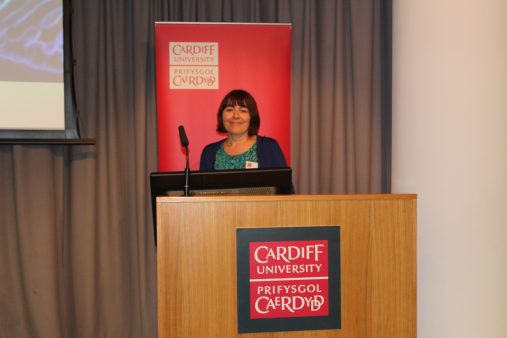Cancer showcase event leads to immunotherapy gift
22 August 2017
In June Cardiff University hosted ‘Your cancer is not my cancer: is personalised medicine the future?’- a showcase of the world class cancer research being undertaken by the University’s academics.
The event featured the work of Professor Awen Gallimore whose research focuses on immunotherapy and, in particular, whether specific blood vessels can help cancer-fighting immune cells permeate into tumours more effectively. Following the successful event, a gift of £10,000 was made to support Professor Gallimore’s work by the charity Cancer and Genetics UK. Nick Phillips, director of the charity, said:
I was impressed with Professor Gallimore’s recent presentation in London, on the cancer immunology research being undertaken at Cardiff University. The immune system is very complex and Professor Gallimore explained clearly about cancer immunology and how it can be designed for successful cancer therapies.
The donation will be used to fund an IMARIS Imaging System which can be used to identify bottlenecks to successful immunotherapy. Recent advances indicate that it is possible to use the power of the immune system to fight cancer. Whilst there have been notable successes in the treatment of melanoma, there remain significant bottlenecks to success in other cancers. This may be due to the nature of the environment in which the cancer is growing. In the case of some cancers, the nature of the environment is such that it allows immune cells to enter unimpeded whilst in other cases, components of the cancer environment prevent effective entry of immune cells. This is a significant problem; if the immune cells cannot enter a cancer, they will fail to kill it.
One key objective of Professor Gallimore’s research is to identify components of the environment that allow or prevent entry of immune cells. To achieve this, sections of tumour cells are analysed in detail using fluorescently- or chemically-labelled tags that allow researchers to formulate a map of the cancer environment which takes into account:
- The cancer cells,
- Other cell types present which render cancer cells more or less aggressive
- Cells of the immune system
- Blood vessels
Visualisation of the component parts is carried out using microscopy and images are recorded for further analysis. The IMARIS software system will significantly improve the ability to perform in-depth analysis of these stained tissues. It will allow researchers to trace individual cells as well as examine their spatial and functional relationships with other cells. The software is also quantitative and will help to determine the frequencies of particular cell types or the size of tumour blood vessels. Moreover, it will allow for analysis using thick pieces of tissues thereby improving significantly on the quality and quantity of information to be gained.
This work will ultimately identify pathways which can be targeted by pharmacological and/or biological therapies and can be used to maximise the power of the immune system for killing cancer.
- July 2024
- June 2024
- May 2024
- April 2024
- March 2024
- February 2024
- January 2024
- December 2023
- November 2023
- October 2023
- September 2023
- August 2023
- July 2023
- June 2023
- May 2023
- April 2023
- March 2023
- February 2023
- January 2023
- November 2022
- October 2022
- September 2022
- August 2022
- July 2022
- June 2022
- May 2022
- April 2022
- March 2022
- February 2022
- January 2022
- December 2021
- November 2021
- October 2021
- September 2021
- August 2021
- July 2021
- June 2021
- May 2021
- April 2021
- March 2021
- February 2021
- January 2021
- December 2020
- November 2020
- October 2020
- September 2020
- August 2020
- July 2020
- June 2020
- May 2020
- April 2020
- March 2020
- January 2020
- December 2019
- November 2019
- October 2019
- September 2019
- August 2019
- July 2019
- May 2019
- April 2019
- March 2019
- February 2019
- January 2019
- December 2018
- November 2018
- October 2018
- September 2018
- August 2018
- July 2018
- June 2018
- May 2018
- April 2018
- March 2018
- February 2018
- December 2017
- November 2017
- October 2017
- September 2017
- August 2017
- July 2017
- June 2017
- May 2017
- April 2017
- March 2017
- February 2017
- January 2017
- November 2016
- October 2016
- September 2016
- July 2016
- June 2016
- May 2016
- April 2016
- March 2016
- February 2016
- January 2016
- December 2015
- November 2015
- October 2015
- September 2015
- August 2015
- January 2015
- December 2014
- November 2014
- September 2014
- August 2014
- May 2014